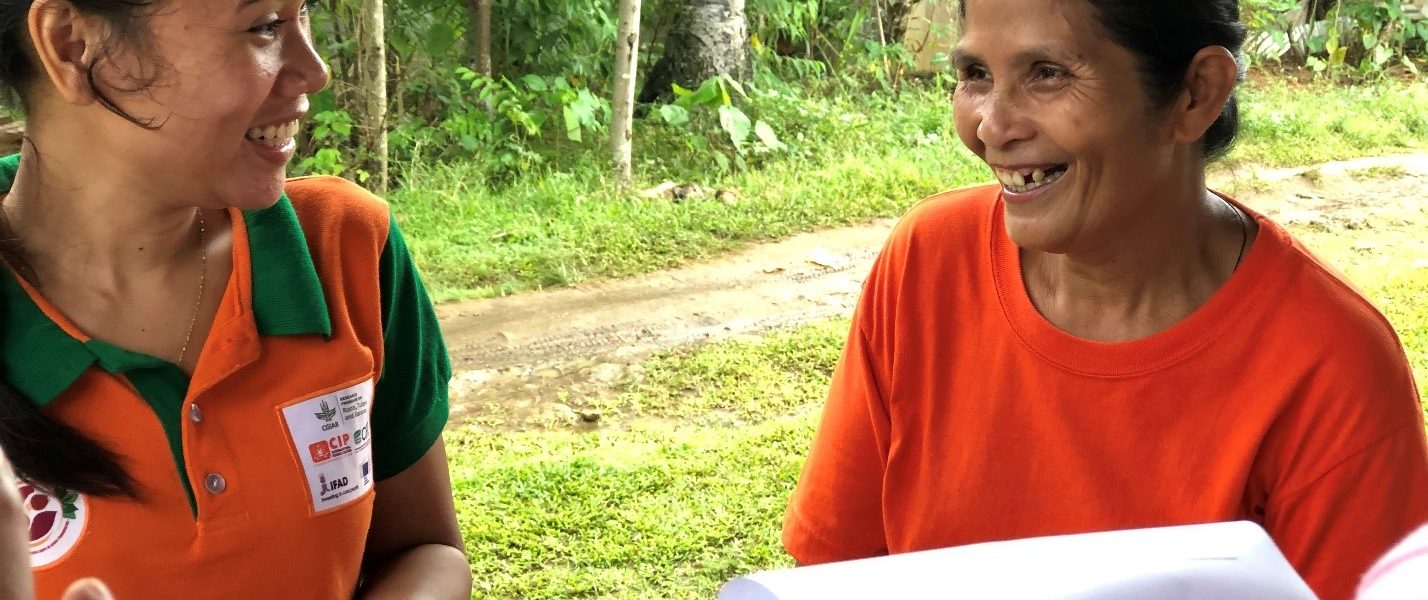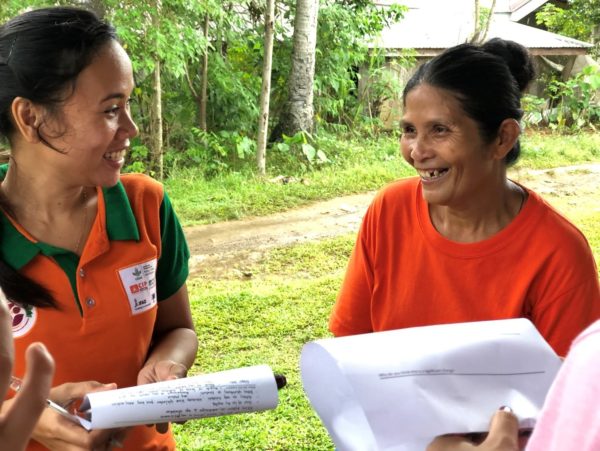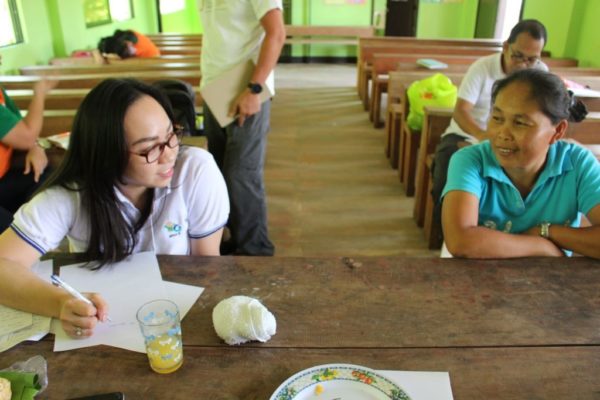Story-telling is a powerful communication tool as it is useful to captivate people’s interest. The Food Resilience through Root and Tuber Crops in Upland and Coastal Communities of the Asia Pacific (FoodSTART+) uses the Most Significant Change (MSC) approach to gauge the impact of the Farmers Business School (FBS) interventions and showcase the outcomes brought to the target beneficiaries of its partner International Fund for Agricultural Development (IFAD) investment projects such as the Fisheries, Coastal Resources, and Livelihood (FishCORAL) Project and the Integrated Natural Resources and Environmental Management Project (INREMP) in the Philippines.
MSC is a participatory monitoring and evaluation tool that allows community members to tell the story of what they value as a significant change in their personal lives that was brought about by a project.
As a starting activity for this collaboration, FoodSTART+ organized a training workshop on the MSC approach for nine members of its team and partners from FishCORAL and INREMP on 25-26 September 2018 in Tagbilaran, Bohol in the Philippines. The training aimed to equip the participants on using the approach to evaluate the FBS through stories and become trainers themselves.
Willy Pradel, an agricultural economist from the CIP Headquarters in Lima, Peru and an expert in the approach, served as the resource person. Following the theoretical part, the group had firsthand experience on story collection with the involvement of the FBS participants in Lundag Eskaya Tribe Multipurpose Cooperative (LETMULCO) in Pilar, Bohol, which is one of INREMP’s project sites. By conversing with the cooperative members, training participants identified the various changes that occurred upon the implementation of the FBS – mostly increased knowledge of food processing, product development, and business and marketing skills.
In December 2018, a new batch of INREMP staff was trained on MSC in Bohol. The training involved story collection in three FBS sites, the San Miguel Association Resource Team (SMART), the San Carlos Association for Rehabilitation of Environmental Denudation (SCARED), and the Concepcion Livelihood and Environmental Association Project (CLEAP).
One story came from Elizabeth Timblaco, Manager of Camoteville, SCARED Group Brgy., San Carlos, Danao, Bohol. The SCARED Group chose sweetpotato as the main crop for processing in the FBS as it is the most common crop planted by farmers in their area.
Elizabeth said that during her involvement in the FBS, she learned that aside from the simply steamed sweetpotato and camote cue (caramelized sweetpotato snack), they can process it into other delicacies that will generate higher income. She learned the basics on how to process and properly package the products from the various trainings conducted. The SCARED Group was also able to share the knowledge and learnings to their neighbors which strengthen their bond.
She shared that a significant difference made by the FBS in their community is that people are now being more productive by participating in the processing of products. Before the FBS, there were a lot of bystanders in their area playing card games.
“I can say that the significant change of the FBS is that it helped our community minimize the vices of the people. It also provided income which is a huge help in the daily needs of the people in the area,” Elizabeth mentioned.
Another significant difference is that they were able to pay the school allowance for their children. She said that by letting their children help to sell their products, the kids are learning to save money and how to be business-minded people that will help them in their future endeavors.
“There are also times that we let our kids sell the products in their respective schools and in return we give them commission,” she added.
As a member of the SCARED Group Board of Directors, Elizabeth is looking forward to the time when they can stand on their own as an organization after INREMP ends. She also hopes for the business to expand so that those people in the area who are working outside the community will be able to come back to their families without worrying about money because there will be jobs for them.
Another story was from Apoloniana N. Bingas, Member of Camoteville, SCARED Group Brgy. San Carlos, Danao, Bohol. She is a housewife and has always hoped to have a better life and a good future for her children but was doubtful as she doesn’t have any source of income. With prayers, perseverance, and love from her family, she never lost hope and vision that someday they will be able to have a greater life ahead.
In 2017, Apoloniana was one of the 20 people who joined the FBS in their community. With eagerness and curiosity, the enrollees attended several meetings and trainings about the FBS and learned from the seven modules of the FBS.
She felt fortunate that she was able to deepen her knowledge in promoting their products to the market through her personal encounter with the customers that she got to know from the FBS. She became one of the workers in Camote Ville where they process products out of sweetpotato such as chips, jam, ketchup and juice/beverage. Today, their products are already in the market and are being displayed at Bensan Store, Danao Adventure Park, and the nearby schools.
Sweetpotato juice and chips are their best sellers while sweetpotato jam is on order basis only. The association is creating some innovations and strategies in order for them to tap more customers in the market and be known. Aside from the employment and additional income the community has also relished the health benefits of sweetpotato, being it rich in vitamins and minerals.
Out of the profit, the association is gaining, Apoloniana receives a daily salary of about 75 to 100 pesos (US$ 1.5-2.0), which allows her to provide snacks such as sweetpotato chips and juice to her children.
She personally hopes that the FBS trainings and workshops will continue and extend more assistance to them so that they will continue to grow and be able to learn more techniques for the success of their chosen business. And as a woman, she will be motivated, refreshed about business, equipped, and have a strong mindset as challenges of the business come along. Apoloniana’s life-changing motto is to “make your mindset a top business priority because the action you take (or don’t take) always stems from your thoughts. Plan your work and work your plan.”
The significant change that happened to the communities due to the FBS is that their socio-economic status has improved. Women are empowered through employment and have access to additional income for their families. The knowledge and skills the community acquired through the FBS trainings and workshops are priceless.
The MSC stories on the FBS will be compiled in a coffee table book, which is planned to be published in the second quarter of 2019.
The blog was written by Arma R. Bertuso and Camille Joy V. Enalbes
References:
Dart, JJ. & Davies, R. 2003. A Dialogical, Story-Based Evaluation Tool: The Most Significant Change Technique. American Journal of Evaluation. Vol. 24, No. 2, pp. 137-155.
Serrat, O. 2009. The Most Significant Change Technique. Asian Development Bank. Retrieved from https://www.adb.org/sites/default/files/publication/27613/most-significant-change.pdf
Additional Info:
The MSC is a useful and participatory technique in the monitoring and evaluation of an intervention that does not employ quantitative indicators (Serrat, 2009). According to Dart and Davies (2003), the MSC is a “dialogical, story-based technique with a primary purpose to facilitate program improvement by focusing the direction of work towards explicitly valued directions and away from less values directions”. First used in a rural development program in Bangladesh, (Davies, 1996 as cited by Dart & Davies, 2003), MSC is now used by many international development organizations to monitor and evaluate their programs (Dart, J & Davies, R, 2003).


